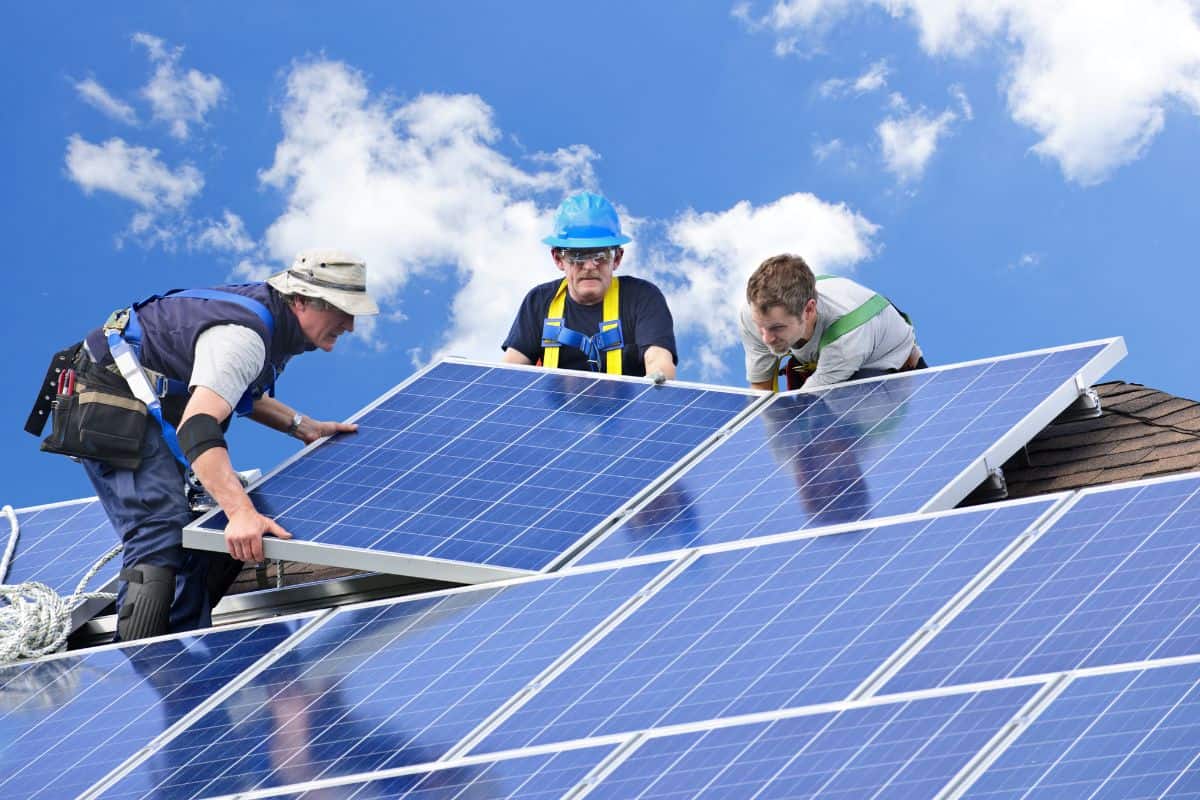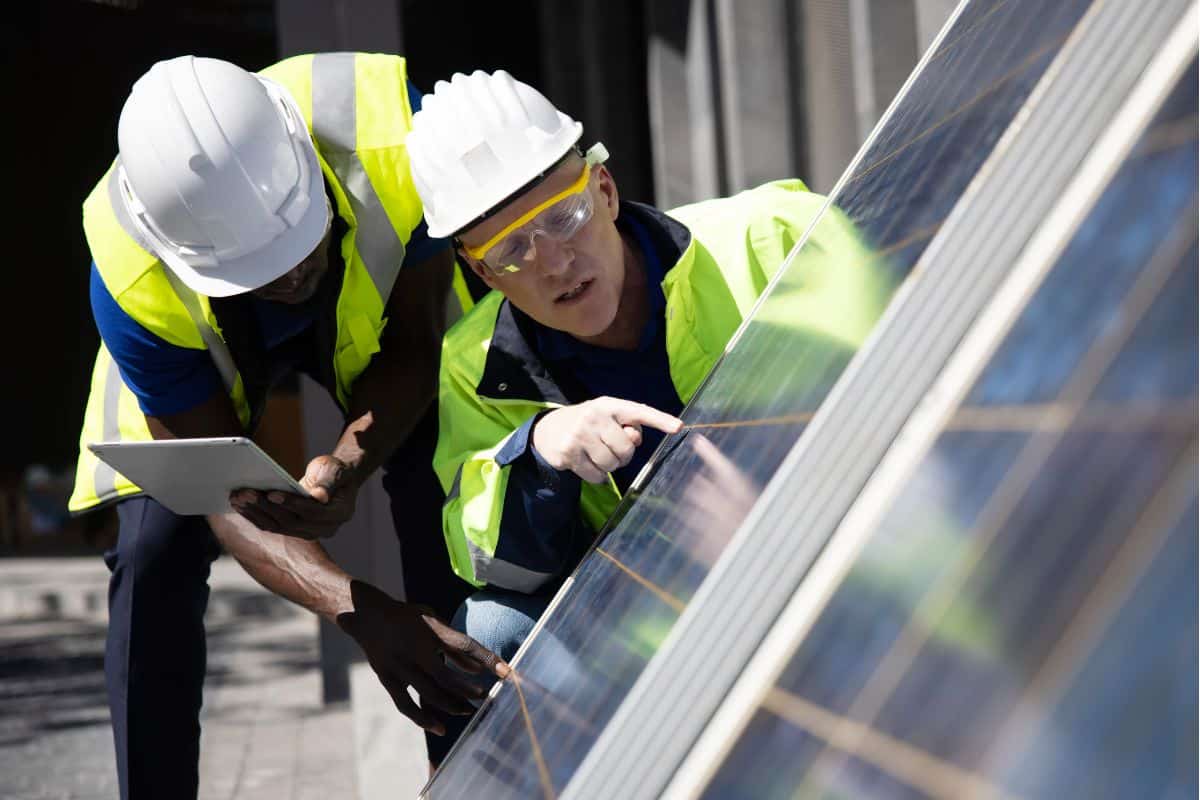So, you’ve decided to transition into sustainable living and are wondering, “What should I look for in a solar installer?” That’s a great question, one that can make the difference between a successful solar project and an investment gone wrong.
Your choice of a solar installer will play a critical role in how effective, efficient, and durable your solar system will be. Picking the right installer is more than just going for the lowest price or the first company that pops up on Google. It involves diligent research, critical thinking, and an understanding of your specific energy needs.

Your solar installer should be someone that you trust, someone who can confidently answer all your queries and be there to guide you through the process of going solar. Here are some key considerations to keep in mind when choosing your solar installer.
There are a number of things to look out for when looking for a solar installer:
- Experience and reputation
- Licensing and certifications
- Comprehensive services
- Warranties and guarantees
- Cost and financing options
- In-House Team vs. using subcontracting
- Insurance
- Industry Partnerships
- Transparent Sales Process
- Custom Solar Solutions
- Maintenance and Support
- Knowledge and Education
- Environmental Commitment
Let’s now dig into each of these things in a bit more detail…
1. Experienced and Reputable Solar Installer
The first thing to consider when choosing a solar installer is their experience and reputation. This involves looking at how long they’ve been in the solar industry, the number of installations they’ve completed, and the reviews and testimonials from previous customers.
A company with a long-standing presence in the solar industry indicates stability and a certain degree of expertise. Furthermore, a company that has successfully completed numerous installations will likely be familiar with the intricacies involved in the process, including obtaining necessary permits, dealing with utility companies, and understanding local solar incentives.
Online reviews and testimonials can provide a glimpse into the experiences of past customers. Look for consistent themes in the reviews, whether positive or negative. Keep in mind, however, that no company is perfect, and there may be negative reviews even for the best companies.
2. Solar Installation Licensing and Certification
Licensing and certification are crucial elements to consider. A reputable solar installer should have all the necessary licenses and certifications required by your local, state, or national regulatory bodies.
In the United States, for instance, look for a company that employs installers certified by the North American Board of Certified Energy Practitioners (NABCEP). This certification is considered the gold standard in the solar industry and demonstrates a high level of competence and professionalism.
3. Comprehensive Sollar Installation Services
Another crucial factor to consider is the range of services offered by the solar installer. Ideally, the company you choose should offer comprehensive services, from the initial consultation and site assessment to installation and aftercare.
This ensures that all aspects of your solar project are handled by a single entity, improving communication and coordination. Furthermore, companies that offer comprehensive services are likely to stand by their work and be available for maintenance and troubleshooting after the installation.
4. Warranties and Guarantees
A good solar installer will offer solid warranties and guarantees. This not only shows confidence in their workmanship but also provides you with peace of mind.
There are two main types of warranties to look out for – equipment warranties and workmanship warranties. Equipment warranties cover the solar panels and inverters, and these are typically provided by the manufacturers. Workmanship warranties, on the other hand, cover the installation work and are provided by the installer.
5. Solar Installation Cost and Financing Options
Lastly, consider the cost and financing options. While the price should not be the sole deciding factor, it’s important to ensure that you’re getting good value for your money. Get quotes from several companies and compare what each package includes.
Moreover, a reputable solar installer should be able to offer or advise on various financing options such as loans, leases, and power purchase agreements (PPAs), or help you apply for solar incentives and rebates.
In conclusion, finding the right solar installer is a vital step in your journey to sustainable living. By considering the above factors, you can ensure that you select a company that will provide a high-quality installation and excellent customer service, ensuring you get the most out of your solar investment.

6. In-House Team vs. Subcontracting
Some solar companies have an in-house team of installers, while others outsource the actual installation work to subcontractors. While subcontracting isn’t necessarily a bad thing, companies with in-house installation teams often have better quality control and accountability.
7. Insurance
Make sure your solar installer carries the right insurance and bonding. This protects you from liability should any accidents occur on your property during the installation process. A reputable installer won’t hesitate to provide proof of insurance.
8. Industry Partnerships
Installers who are partners with leading solar manufacturers may have access to the best equipment, training, and warranty options. Look for companies that are partners with major brands like SunPower, Panasonic, or LG.
9. Transparent Sales Process
A good solar company won’t pressure you into signing a contract right away. They should provide a detailed quote, explaining all the costs and savings, and give you ample time to consider your options and make an informed decision.
10. Custom Solar Solutions
Every home or business is unique in its energy needs and goals. The best solar installers offer custom solar solutions rather than a one-size-fits-all approach. They should take into account your energy usage, roof design, geographic location, and budget to design a system that’s just right for you.
11. Maintenance and Support
Beyond installation, check if the company provides ongoing maintenance and support. Some companies offer maintenance services, system monitoring, and prompt customer support to help you keep your system running optimally.
12. Knowledge and Education
Your solar installer should take the time to educate you about solar energy, how your system will work, and how to maintain it. They should answer all your questions and provide clear, understandable explanations.
13. Environmental Commitment
If sustainability is important to you, you might want to choose a company that demonstrates a commitment to environmental stewardship, not just in the products they install, but also in their business practices.
Now that you know what you are looking for in a solar installer, let’s dig into what you need to look out for…
Red Flags: Things to Avoid in a Solar Installer
Being aware of potential issues can save you from a less-than-stellar experience and ensure that you’re making a wise investment in solar energy. Here are 8 things to avoid when choosing a solar installer.
- High-Pressure Sales Tactics
A reputable solar installer should give you ample time to make a decision. If a company is pressuring you into signing a contract immediately, especially without giving you time to read through it thoroughly, that’s a red flag.
- Lack of Credentials
Check for proper licensing, certification, and insurance. Any installer worth their salt will have these and be willing to provide proof. The lack of these essential credentials is a warning sign.
- Limited Experience
Installing solar panels is a complex job that requires expertise and experience. Companies that are new to the field or have a limited portfolio may not have the skills necessary to ensure a quality installation.
- Bad Reviews
Online reviews are a valuable resource when evaluating a solar installer. While every company might have a few negative reviews, consistently poor ratings or complaints should raise alarms.

- Overpromising Savings
Be wary of installers who promise extraordinarily high savings on your energy bills. While solar energy can certainly help reduce your costs, it’s important to have realistic expectations.
- Lack of a Physical Address
A reputable solar installer should have a physical address and not just a P.O. box. A physical location indicates a certain level of professionalism and commitment.
- Low-Quality Equipment
Not all solar panels are created equal. Be cautious of companies that only offer cheap, low-quality equipment. While the upfront cost may be lower, they can end up costing more in the long run due to lower efficiency and shorter lifespan.
- Lack of Transparency
If a company is not willing to provide a detailed contract or explain the costs and savings associated with the system, it’s a warning sign. You should have a clear understanding of what you’re paying for, how much you’ll save, and what services are included.
Doing your due diligence and watching out for these potential pitfalls can save you from headaches down the line.
Remember, the aim is not just to go solar, but to do it in a way that delivers the maximum benefits with a smooth and satisfying process.
The Essential Guide: Top Questions to Ask a Solar Installer and What Answers to Expect
So, you’ve weeded out the bad apples and narrowed down your list of potential solar installers.
Great job!
Now comes another crucial step – interviewing your shortlisted installers.
So often when dealing with a complicated subject like solar installations, we often don’t know what we don’t know.
Here are the questions you should be asking a potential solar installer and what responses you should be looking for:
- How much experience do you have?
They should have multiple years of experience and a large portfolio of completed installations. Their experience should be specific to solar power systems, not just general electrical work.
- Are you licensed and insured?
The answer must be a confident “Yes”, and they should be able to provide proof. Check their license number against the database of your state’s licensing board to verify.
- What kind of warranties do you offer?
Good solar installers will offer workmanship warranties of at least one year, and they should explain the manufacturer’s warranties on the panels and inverters as well.
- Can you provide references?
A reliable installer will happily give you references. You can then contact these previous customers to ask about their experiences.
- Do you outsource any work?
If the company does outsource, they should explain who will be doing the work and how they ensure quality. Ideally, they should handle all the work themselves.
- What’s the estimated payback period for my system?
A good installer will be able to provide a detailed financial analysis, including an estimated payback period based on your energy usage and local electricity rates.
- How do you handle the permit process?
They should handle all permitting processes themselves. It’s part of their job to ensure the system meets local zoning and building codes.
- Can you provide a detailed, itemized quote?
They should be able to give you a quote that includes all costs – equipment, installation, permits, and any necessary structural modifications.
- What happens if my system doesn’t produce the expected energy?
They should have performance guarantees in place, and they should explain the steps they’ll take to fix any underperformance issues.
- What maintenance does the system require, and who is responsible for it?
Solar systems require minimal maintenance, but the installer should explain any necessary upkeep. They should also describe their role in maintenance or repair issues that might arise.
Armed with these questions and the corresponding answers you should expect, you are ready to interview your shortlisted solar installers.
You’re investing a significant amount of money and trust in this company, so it’s crucial to get it right. Good luck on your journey to solar power!

Warning Signs: How to Spot a Scam Solar Installer
Making the switch to solar energy is a significant investment, and the last thing you want is to fall prey to a scam artist posing as a reputable solar installer.
But don’t worry, we’re here to equip you with the knowledge to detect and avoid fraudulent solar installers.
One of the first things to look for is high-pressure sales tactics. A trustworthy solar installer understands the importance of this decision and will give you the space and time you need to make it.
They won’t pressure you into signing a contract on the spot or use fear-based selling tactics, such as telling you that the price will skyrocket if you don’t commit immediately.
Another red flag is a lack of communication or professionalism. This could include not returning calls or emails promptly, missing appointments without explanation, or having a generally unprofessional demeanor.
A reputable company values customer service and will make every effort to ensure a smooth and transparent process.
If a solar installer does not have a physical office location or is unwilling to share it, be cautious.
This could suggest they’re a fly-by-night operator intending to take your money and run. Always do your due diligence and check out their physical office location.
The absence of proper licensing and insurance is another surefire sign of a scam.
Solar installation is a technical job requiring specific qualifications.
A legitimate installer will have all the necessary licenses and insurance, and they should be able to show you these credentials without hesitation.
You can verify this information with your local government or the North American Board of Certified Energy Practitioners (NABCEP).
An unusually low quote can also be a warning sign. While it might be tempting to go with the cheapest offer, remember the old adage, “You get what you pay for.”
Quality solar installations are an investment, and a suspiciously low quote can often mean shoddy workmanship or subpar equipment.
Lastly, beware of solar installers who promise unrealistic energy savings. Solar power can indeed save you money over the long term, but any installer guaranteeing to eliminate your energy bill entirely is likely overselling to close the deal.
By keeping these warning signs in mind, you’ll be well on your way to spotting and avoiding scam solar installers. Always remember, it’s better to take your time and thoroughly research your options than to rush into a decision you may regret later.
